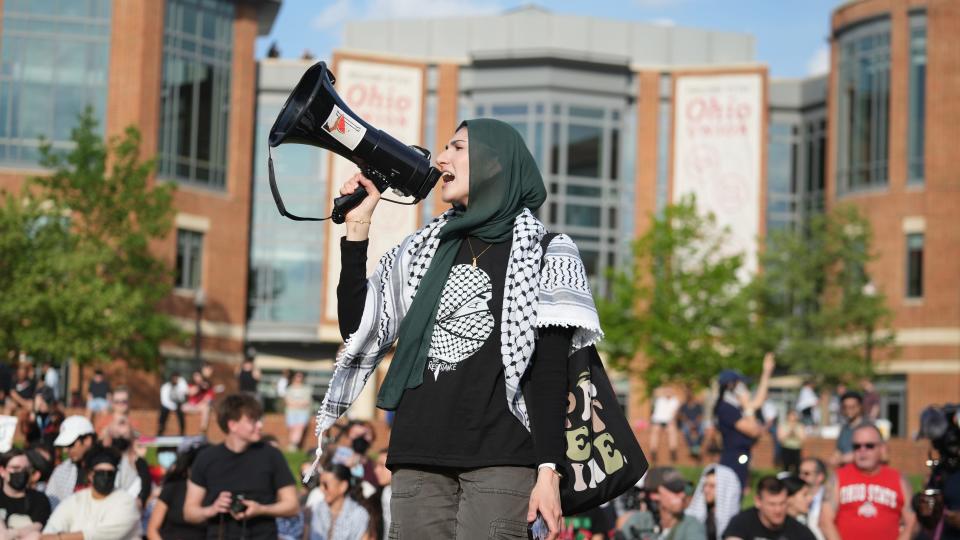Were OSU students protesting against oppression or being antisemitic? Perspective matters.
Columbus resident Aaron Yarmel is the associate director of the Center for Ethics and Human Values at Ohio State University.
I will never forget the first two students who entrusted me with their pain in the weeks after October 7.
Both had loved-ones who had been captured, killed, or placed at risk of injury or death. Both were terrified of violence from bigots. Neither trusted our institutions to keep them safe. One is Jewish, the other Muslim.
As Israel began its operations in Gaza, as campuses across the nation erupted into protests, and as we were left to sift through an overwhelming deluge of contradictory information, I faced a challenge: what did it look like to show the deepest forms of respect for these students and everyone else who opened up to me about their experiences?
Why did Hamas attack Israel? Terrorists continue Hitler's murderous tradition against Jews
Civil discourse and civility

As I discussed in another guest column, one important part of the answer is to engage with people in civil discourse: an activity in which people talk to one another across disagreements to collaborate in the search for better answers to meaningful questions.
Yet I worry that there are certain times when calling for civil discourse fails to honor other people’s perspectives.
Sometimes people wrongly view a commitment to civil discourse as a commitment to civility, in the sense of emotionlessness, inoffensiveness, or politeness. Since proximity to an issue and emotional salience go hand in hand, such calls promise the exclusion of the perspectives of those with the most at stake.
Calls for civil discourse can also fail to honor a perspective when they come at the wrong time.
In Dr. Martin Luther King Jr.’s "Letter from Birmingham Jail," he famously describes using nonviolent direct action to create “a crisis and foster such a tension that a community which has constantly refused to negotiate is forced to confront the issue.”
While this is certainly not an endorsement of all instances of direct action everywhere, King found that setting the stage for civil discourse tomorrow sometimes requires other forms of nonviolent direct action today.
This brings me to student protests.
I will set aside questions about the morality or efficacy of these protests and universities’ responses to them. Instead, I simply want to ask, what does it look like to honor the diverse perspectives of students who are experiencing protests from the inside or the outside?
How do we honor perspective
The first part of my answer is that honoring a perspective requires us to understand it, and a necessary condition for that is believing people when they report their interpretations of the words they use and hear.
For example, consider Zionism: some see it as a commitment to self-determination and to a right of Jewish people to a place where they will be safe from pograms and genocide, while others use it as a label for what they see as a campaign of ethnic cleansing. Another example: some people use “Intifada” to refer to a shaking off of oppression, while others hear it as a call for violence against Jewish people.
The second part of my answer is that we ought to be much more thoughtful about how we assess offensiveness, and this is because there is no general consensus about how to balance speaker meaning against listener meaning. It is convenient to defer to speaker meaning when people find your speech offensive or to listener meaning when you are the one offended, but both approaches backfire when the roles are reversed.
Aaron Yarmel: Jewish, Palestinian students are terrified. Why colleges must try what Ohio State is doing.
This has all been very theoretical, so let’s consider what it looks like in practice. On May 1, I went to experience an ostensibly peaceful student protest on the Ohio State campus along with dozens (if not hundreds) of other faculty and staff.
When I interpreted chants in accordance with the meanings that I believed the students were attributing to them, I did not perceive anti-semitism–especially since a significant minority of them had visibly identified themselves as Jewish.
Instead, I saw students seeking to fight oppression. At the same time, I knew with complete certainty how some of the chants would be interpreted by other members of the OSU Jewish community who had shared their perspectives.

As I imagined their faces and listened, to the best of my ability, through their ears, I was filled with an overwhelming sadness.
More: Ohio has made felony charges, arrests 'consequences' of peaceful protest
What I did then, and what I will continue to do, is lean into, rather than away from, the discomfort and tension that arises when we view an event through the perspectives of everyone who is engaging in good faith.
Such a practice is not a commitment to relativism or inaction, since people can genuinely hold incorrect views and sometimes we must disrupt the forces that maintain a facade of peace in order to expose the conflicts hidden beneath its surface.
It is, instead, the only way I know how to engage authentically across differences while preserving a possibility for what King called the beloved community.
Columbus resident Aaron Yarmel is the associate director of the Center for Ethics and Human Values at Ohio State University. In addition to overseeing all CEHV programs, he leads its efforts on dialogue facilitation and skill building and outreach, with a special focus on Israel and Palestine.
This article originally appeared on The Columbus Dispatch: Campus protests. We must lean into the discomfort and tension.


